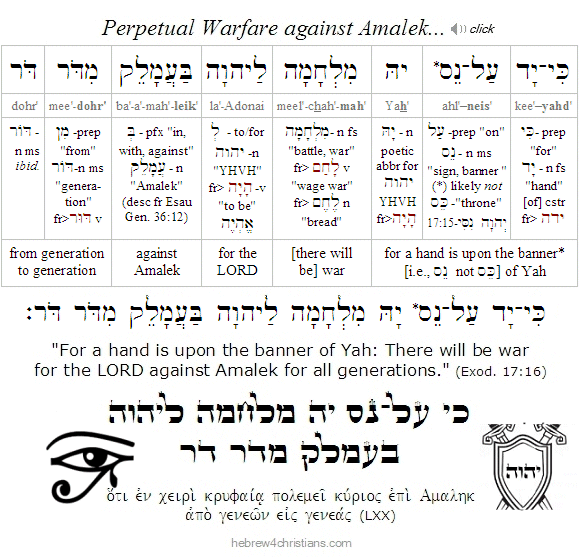|
In parashat Beshalach we had read how "Amalek" attacked the Israelites after they had miraculously crossed over the sea into a new life of freedom (Exod. 17:8). Spiritually speaking the Amalekites aligned themselves with the wicked Pharaoh of Egypt and therefore they sought to continue the war against God's people. Apparently the Amalekite clan in Canaan was founded by a grandson of Esau (Gen. 36:12, 16), though Amalek is also described as the "first among the nations," a man who even predated the time of Abraham (Num. 24:20, Gen. 14:7). In Augustine's terms, Amalek represents the "City of the World," whereas Israel represents the "City of God."
In Jewish tradition, Amalek represents pure evil, or those who have "given themselves over" to Sitra Achra, the dark side of impurity. Indeed the name Amalek (עֲמָלֵק) begins with the letter Ayin (symbolizing the eye) and equals 240 in gematria -- the same value for safek (סָפֵק), meaning "doubt," and for rahm (רָם), meaning "haughty." Amalek therefore represents "the evil eye of doubt," or even "the severed eye" (i.e., when you remove Ayin from "Amalek," you are left with malak (מָלָק), a verb that means "to chop off" or to sever). Understood in this way, Amalek represents spiritual blindness acting arrogantly in the world, and therefore the LORD vowed perpetual warfare against Amalek: "The Hand is on God's throne. God shall be at war with Amalek for all generations" (Exod. 17:16). Concerning this verse the great commentator Rashi noted that the term "God's throne" is written incompletely in Hebrew as kes Yah (כֵּס יָהּ), rather than as kisei Adonai (כִּסֵּא יְהוָה), which suggests that God's rule will be incomplete until the powers of darkness are totally wiped off the face of the earth (by the hand of Yeshua our LORD; see Rev. 19-20). Amalek embodies the principle of lo yareh HaShem, the lack of the fear of God, and therefore represents the power of darkness and evil in the world.
The Torah states that we must "go out and fight" Amalek, which is a call to ongoing spiritual warfare in our lives (Deut. 25:17-19). We can't sit by and passively accept evil; nor can we ignore it or pretend that it doesn't exist. We must call evil by its name and exercise spiritual authority over it (Eph. 5:11; Luke 10:19). The weapons of our warfare have divine power to destroy enemy strongholds (2 Cor. 10:4). We are protected by the armor of God and "weapons of light" (Rom. 13:12; Eph. 6:11-18). Note that the battle with Amalek came after the incident at Marah, where the bitter waters were turned sweet by means of the "healing tree" that was felled (Exod. 15:25), a picture of the cross of the Messiah who gives us living water (mayim chayim) and who saves us from the power of evil and death. When we are cleansed and sanctified by the sacrificial blood, we will overcome evil by the power of God's grace and goodness, though this requires earnest faith on our part. When Moses raised his hands in battle against the Amalekites, the Israelites prevailed, but if he lowered them, they suffered defeat (Exod. 17:11). Eventually Moses grew weary and he needed Aaron and Hur to help him hold his arms steady to ensure victory (Exod. 17:12). Note that the Hebrew word translated "steady" is emunah (אֱמוּנָה), the word for faith... It was Moses' steady faith in God's power that gave Israel the victory over the powers of darkness, just as we lift up our faith in God's power demonstrated at the cross gives us the victory over Satan and his schemes.
Hebrew Lesson
Exodus 17:16 Hebrew reading (click):
 |
Note: For more on what Amalek represents, see the article, "Warfare with Amalek."
<< Return
|



